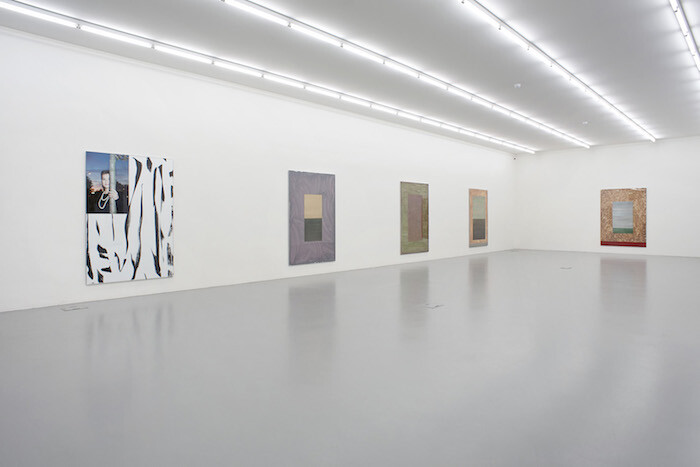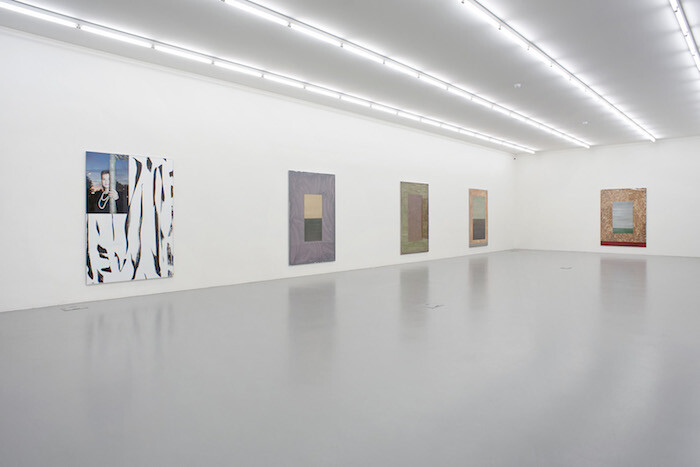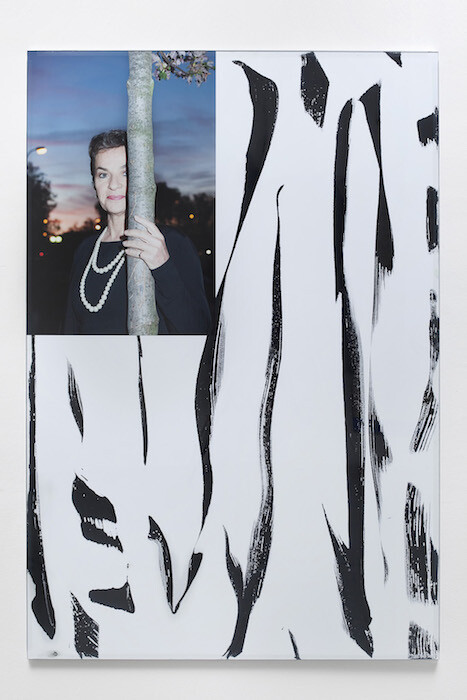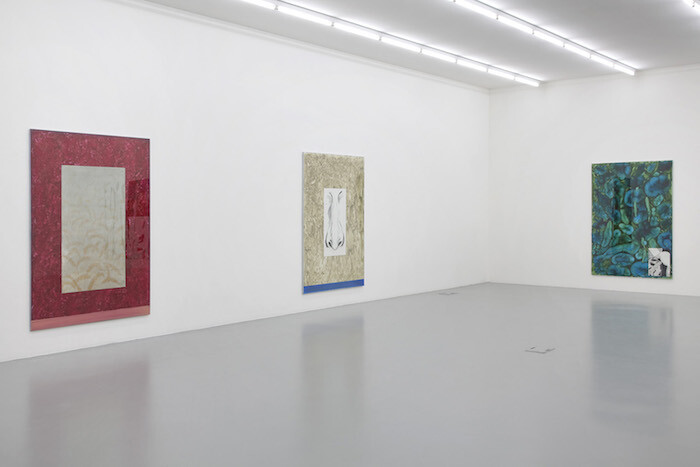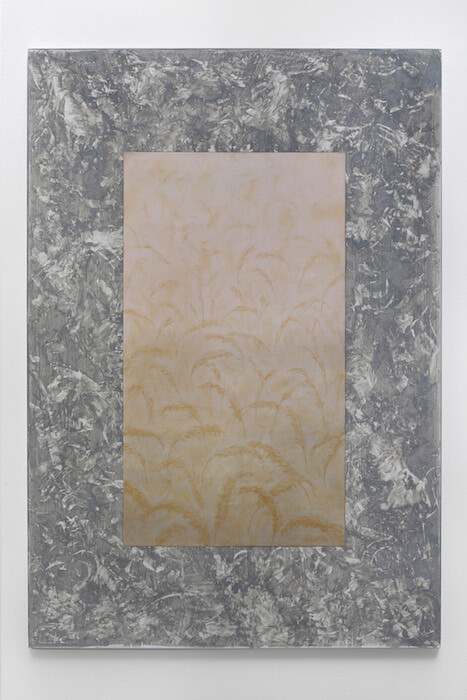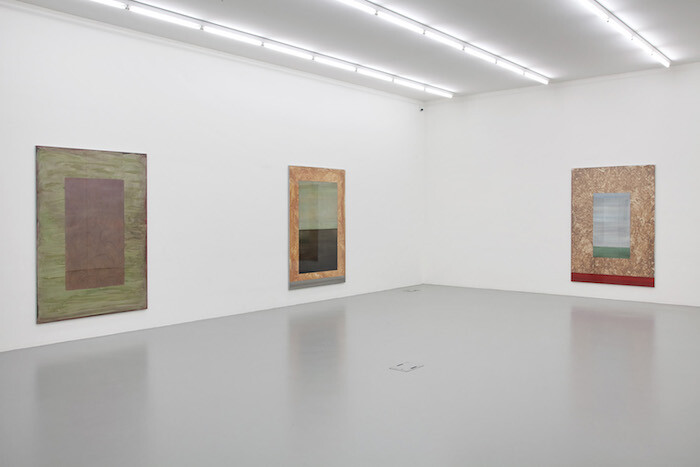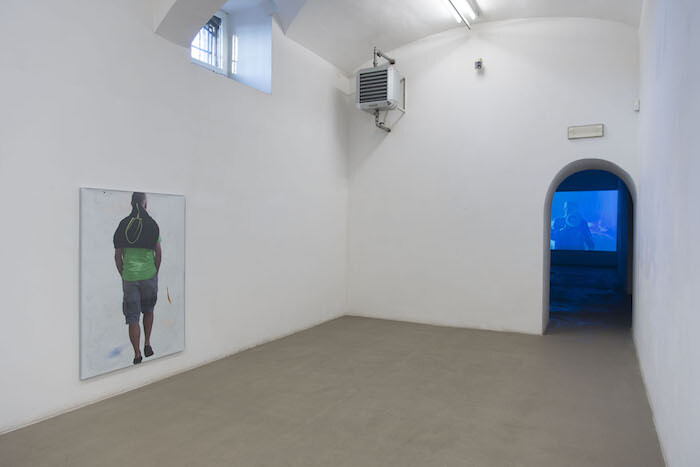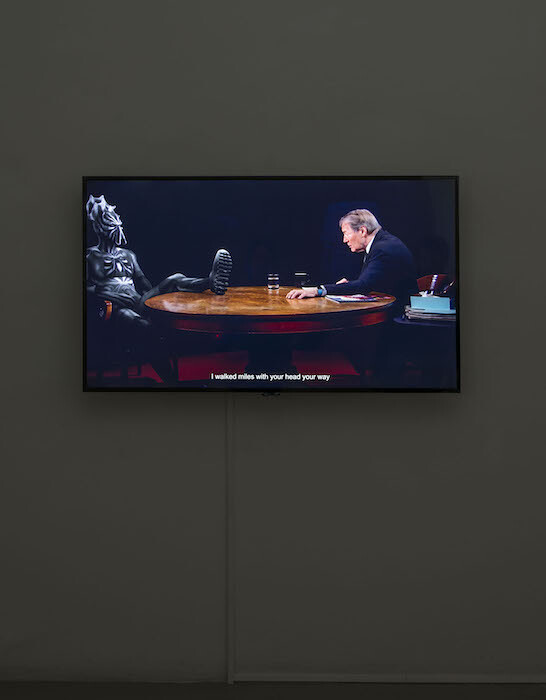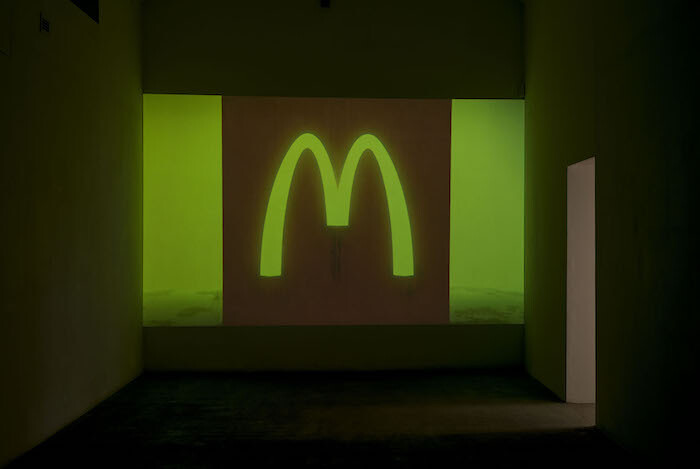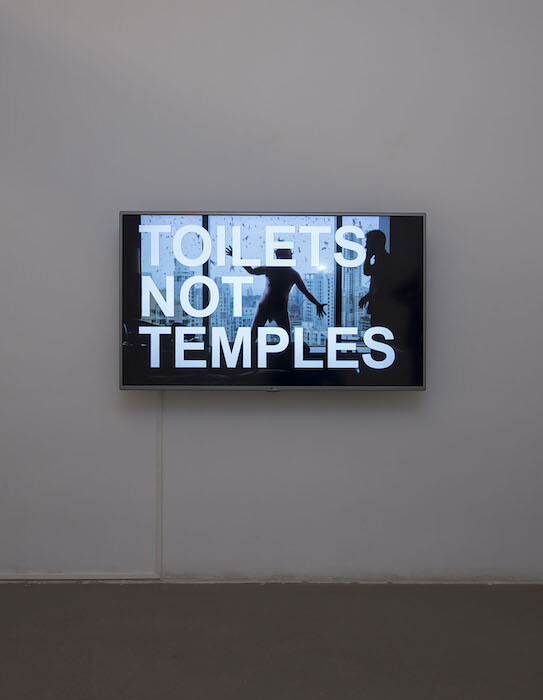It was only a couple of days after the opening, while sitting in the audience of a lecture by Italian playwright Romeo Castellucci at Teatro dell’Arte in Milan, that Will Benedict’s “The Social Democrat” at Giò Marconi really clicked in my head. Call it synchronicity. Castellucci delivered his speech, titled “Seeing Ourselves Seeing” and focused on the role of audiences in generating meaning within the realm of spectacle, with a quiet voice, while standing in an otherwise dim theatre, stripped of all backdrops, so that brick walls were uncharacteristically visible—the σκηνή (stage, scene, fiction) laid bare. Built under Mussolini in 1933 as part of the new rationalist Palazzo dell’Arte, the building testifies to the Fascist exploitation of visual arts as means of mass communication and, obviously, propaganda. Castellucci’s company, Societas Raffaello Sanzio, is currently on tour with a new play, titled Democracy in America after the 1835 book by Alexis de Tocqueville, where “performance is not so much a reflection on politics, as—if anything—on its end,” Castellucci writes.1 “De Tocqueville observed the potential of a young democracy, even while pointing out its dangers and limits, such as the tyranny of the majority, a weakening of intellectual freedom when faced with populist rhetoric, and the ambiguous relation between collective interests and individual ambitions. At the same time, in the New World, Power once again called into question its own representation.” How appropriate.
US-born, Paris-based Benedict centers his works on questioning the construction of our perception of reality—and hence also our perception of the representation of power in an increasingly entropic New World order. The exhibition at Giò Marconi was preceded by three fast-paced videoclips with contents triggered to prompt emotional responses and Pavlovian clickbaiting: social media fearmongering, singing puppies, Donald Trump’s face with “You fucking people make me sick” written over it, Milo Yiannopoulos’s grin, the “grab her by the pussy” transcript, and all the regular mash up and shitstorm we’ve come to associate with US-generated “breaking news” after the presidential elections. How exhausting.
By contrast, the show is quiet and sober, almost sedate. The main room has mostly abstract gouaches on display (all 2017), with one revealing exception, positioned right at the entrance. Titled Christina Figueras, the painting includes a photographic portrait of the diplomat and former Executive Secretary of the UN Framework Convention on Climate Change, who forged the political and economic collaborations leading to the Paris Agreement in 2015. “Did you know her name?” Benedict enquired of me during the opening. “No? Don’t worry, we don’t hear much about people like her, even if she’s ranked as one of the world’s 100 top leaders.” The other paintings have ironic titles, summoning domestic comfort (House Slippers; Large Blanket) and mild anxiety (Fall Expenses, Against your own Interest). The discrete Charm of the Intestine echoes Luis Buñuel’s famous 1972 film, portraying the obsessions and hypocrisies of the Western bourgeoisie, as embodied in a series of interrupted dinners.
The technique, which is typical for the artist, is based on layering and multiplication: Benedict paints with fluid brushstrokes on canvases that he cuts out and neatly inserts in painted foamcore panels. He then encloses each work in a reflective glass, aluminum, and transparent tape frame, so that the viewer’s image is systematically integrated in the piece. As with Dan Graham’s two-way mirror surfaces, audiences see themselves seeing, and are asked to reflect upon what they are looking at. By playing with trompe l’oeil, sprezzatura, and visual ambiguity, Benedict points to complexity. Here, with an elegant palette of sage green, gray, beige, lavender, mauve, organic brown, and maroon shades, halfway between Pompeian Third Style, Japanese zen screens, and post-Rothko sublime, he also brings to mind the fading bon ton and role of the cultured elite and “representative bodies” in running a democracy.
There is only one video on show: I AM A PROBLEM (T.O.D.D.) (2016), screened on a monitor in a side room, with headphones filtering the thunderous soundtrack by Detroit-based noise band Wolf Eyes. Premiered at the 9th Berlin Biennale in June of last year, it shows an alien with a black-and-white mask-like face, black leather pants, and platform boots, interviewed by TV anchorman Charlie Rose, on the subject of immigration—the quintessentially dehumanized Other. How timely.
Benedict seems to play with synchronicity, too. I AM A PROBLEM (T.O.D.D.) is also on display at Fondazione Giuliani in Rome, where the artist makes his debut with a concurrent show, titled “Fiction Is A Terrible Enemy” (curated by Adrienne Drake). To introduce it, he issued a narrative press release in which Trump’s “Law & Order” slogan is associated with the American entertainment industry, as well as with the fact that “millions of people” may end up in jail because of it. Fiction and reality collide in the new music video I AM A PROBLEM (Enemy Ladder) (2017), which is projected on a wall at the end of the main space. “Enemy Ladder” is the title of another aggressive track from Wolf Eyes’ 2015 album, “I Am A Problem: Mind in Pieces.” The video opens with a S.W.A.T. squad, armed with shotguns, barking dogs, and bullhorns, besieging a residential house at night, under torrential rain. From inside the house, only the blinking police lights suggests that something alarming is going on: a young woman quietly reads a book, a blonde kid sleeps hugging her dog. When the voice of Nate Young erupts with “Over and over again, nightmares happen,” Benedict inserts a fast montage of internet videos of dogs, where puppies (with post-produced human teeth) sing in front of microphones and the US flag or eat a slice of pizza in slo-mo.
Feeds and food are recursive subjects in the artist’s videos, which prevail in the Rome exhibition. The Bed That Eats (2015) is an animated “still life,” where bottles and plates rest on an unmade bed, which opens its mattress/mouth to sing as well to swallow. Inside its guts, one discovers McDonald’s yellow arches glowing in the dark. In the mockumentary Toilets Not Temples (2014, made with L.A. journalist David Leonard), which opens with naked bodies falling from the skies, like a biblical plague, Benedict mixes together info on climate change, vineyards, and food crises in India, and a dolphin-headed lady discussing fishing and shopping in Norway. “The idea of consumption and consumerism, how we ‘eat’ images, is deeply embedded in art,” Benedict says in an interview with Martin Clark.2 And in the spectacularized politics of the contemporary—less and less social—democracies, I would say. How toxic.
Romeo Castellucci, http://www.societas.es/opera/democracy-in-america/?lang=en.
Will Benedict, Corruption Feeds (Bergen: Bergen Kunsthall and Motto Books, 2015), 114.
